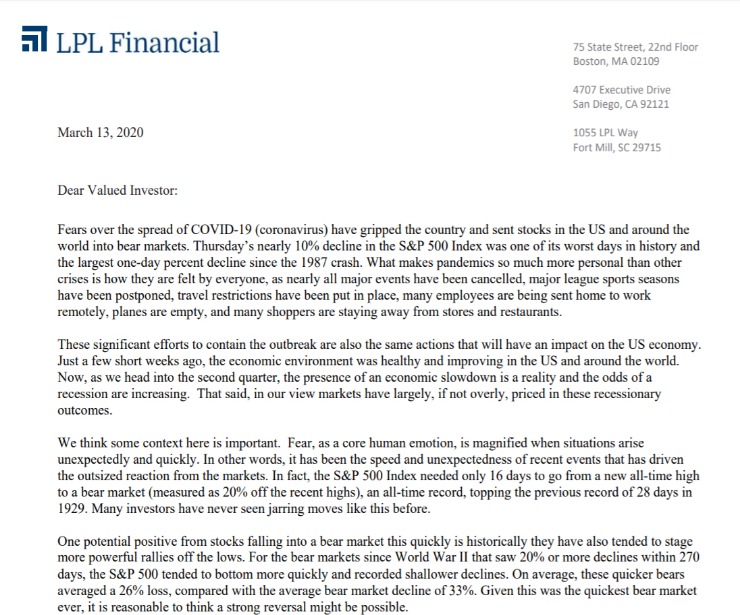Dear Valued Investor:
Fears over the spread of COVID-19 (coronavirus) have gripped the country and sent stocks in the US and around the world into bear markets. Thursday’s nearly 10% decline in the S&P 500 Index was one of its worst days in history and the largest one-day percent decline since the 1987 crash. What makes pandemics so much more personal than other crises is how they are felt by everyone, as nearly all major events have been cancelled, major league sports seasons have been postponed, travel restrictions have been put in place, many employees are being sent home to work remotely, planes are empty, and many shoppers are staying away from stores and restaurants.
These significant efforts to contain the outbreak are also the same actions that will have an impact on the US economy. Just a few short weeks ago, the economic environment was healthy and improving in the US and around the world. Now, as we head into the second quarter, the presence of an economic slowdown is a reality and the odds of a recession are increasing. That said, in our view markets have largely, if not overly, priced in these recessionary outcomes.
We think some context here is important. Fear, as a core human emotion, is magnified when situations arise unexpectedly and quickly. In other words, it has been the speed and unexpectedness of recent events that has driven the outsized reaction from the markets. In fact, the S&P 500 Index needed only 16 days to go from a new all-time high to a bear market (measured as 20% off the recent highs), an all time record, topping the previous record of 28 days in 1929. Many investors have never seen jarring moves like this before.
One potential positive from stocks falling into a bear market this quickly is historically they have also tended to stage more powerful rallies off the lows. For the bear markets since World War II that saw 20% or more declines within 270 days, the S&P 500 tended to bottom more quickly and recorded shallower declines. On average, these quicker bears averaged a 26% loss, compared with the average bear market decline of 33%. Given this was the quickest bear market ever, it is reasonable to think a strong reversal might be possible.
The great news is that the US economy was very healthy before this three-week stretch of steep market declines, with employment strong and the unemployment rate near 50-year lows, solid job and wage gains, corporate profits poised to accelerate, and company balance sheets in excellent shape. This bodes well for a faster recovery on the other side. Like someone who gets sick, the healthier you are coming into it, the faster you tend to recover.
The investor playbook is always to follow your investment plan. The only thing worse than not having a plan is abandoning the one you have. The stock market has already suffered declines similar to those associated with mild recessions. That doesn’t mean stocks can’t go lower. It just means that the opportunity for long-term investors is getting more attractive. While markets continue to face a crisis of uncertainty, we still have unwavering confidence in the long-term fundamentals and prospects for the US economy and corporate America.
Please contact your financial professional with questions.
This material is for general information only and is not intended to provide specific advice or recommendations for any individual. There is no assurance that the views or strategies discussed are suitable for all investors or will yield positive outcomes. Investing involves risks including possible loss of principal. Any economic forecasts set forth may not develop as predicted and are subject to change.
References to markets, asset classes, and sectors are generally regarding the corresponding market index. Indexes are unmanaged statistical composites and cannot be invested into directly. Index performance is not indicative of the performance of any investment and do not reflect fees, expenses, or sales charges. All performance referenced is historical and is no guarantee of future results.
All information is believed to be from reliable sources; however, LPL Financial makes no representation as to its completeness or accuracy.
This research material has been prepared by LPL Financial LLC.
Securities and advisory services offered through LPL Financial (LPL), a registered investment advisor and broker‐dealer (member FINRA/SIPC). Insurance products are offered through LPL or its licensed affiliates. To the extent you are receiving investment advice from a separately registered independent investment advisor that is not an LPL affiliate, please note LPL and makes no representation with respect to such entity.
If your advisor is located at a bank or credit union, please note that the bank/credit union is not registered as a broker-dealer or investment advisor. Registered representatives of LPL may also be employees of the bank/credit union. These products and services are being offered through LPL or its affiliates, which are separate entities from, and not affiliates of, the bank/credit union. Securities and insurance offered through LPL or its affiliates are:
Not Insured by FDIC/NCUA or Any Other Government Agency | Not Bank/Credit Union Guaranteed | Not Bank/Credit Union Deposits or Obligations | May Lose Value
Tracking #1-965300 (Exp. 03/21)
